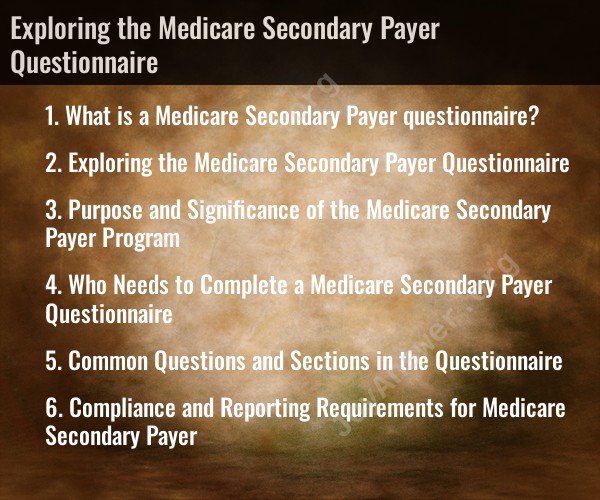What is a Medicare Secondary Payer questionnaire?
A Medicare Secondary Payer (MSP) questionnaire is a document or set of questions used to determine whether another entity, such as an insurance company, is responsible for paying a Medicare beneficiary's medical expenses before Medicare covers those costs. It is a tool used by the Centers for Medicare & Medicaid Services (CMS) to identify situations where Medicare should be the secondary payer, not the primary payer.
Medicare is considered the primary payer for medical expenses for eligible individuals, but in certain situations, other insurance plans or entities may have primary responsibility for covering healthcare costs. The MSP questionnaire helps identify these situations and gather relevant information to ensure that Medicare pays secondary to the primary payer.
Typically, MSP questionnaires are used in cases where a Medicare beneficiary is involved in a situation that might involve other insurance coverage, such as:
Workers' Compensation: If a person is injured on the job, workers' compensation insurance is typically the primary payer for medical expenses related to the workplace injury.
No-Fault Insurance: In cases of auto accidents, some states have "no-fault" insurance laws, making auto insurance the primary payer for medical expenses related to the accident.
Group Health Insurance: If a person has group health insurance through their employer or a spouse's employer, that insurance is usually the primary payer for medical expenses.
Liability Insurance: In cases involving personal injury or liability claims, such as slip and fall accidents, the liability insurance of the responsible party may be the primary payer.
The MSP questionnaire helps Medicare gather information about these situations and coordinate benefits to ensure that the appropriate insurance entity pays first, reducing the financial burden on Medicare. If you receive an MSP questionnaire, it's important to complete it accurately and promptly, as it helps determine the correct order of payment and avoid potential overpayments or billing issues. Failure to provide the requested information on the MSP questionnaire may result in delays or complications with your Medicare coverage and payment of medical expenses.
Exploring the Medicare Secondary Payer Questionnaire
The Medicare Secondary Payer (MSP) Questionnaire is a tool used to determine whether Medicare is the primary or secondary payer for a patient's medical services. The questionnaire is typically completed by healthcare providers when a patient is admitted to the hospital or receives outpatient services.
Purpose and Significance of the Medicare Secondary Payer Program
The MSP Program is a complex set of rules that determine which payer is responsible for paying for a patient's medical expenses when there is more than one payer involved. Medicare is the secondary payer when another payer, such as an employer-sponsored health insurance plan, is the primary payer.
The MSP Program is important because it helps to ensure that Medicare beneficiaries do not have to pay out-of-pocket for medical services when another payer is responsible for paying. The program also helps to protect Medicare from paying for services that should be paid for by other payers.
Who Needs to Complete a Medicare Secondary Payer Questionnaire
All healthcare providers who bill Medicare must complete an MSP Questionnaire for each Medicare beneficiary who receives services from their facility. The questionnaire must be completed before or at the time of service.
Common Questions and Sections in the Questionnaire
The MSP Questionnaire typically asks questions about the patient's employment, health insurance coverage, and other sources of payment for medical services. The questionnaire also asks questions about the specific medical services that the patient is receiving.
Compliance and Reporting Requirements for Medicare Secondary Payer
Healthcare providers who bill Medicare are responsible for complying with the MSP Program's rules and regulations. This includes completing the MSP Questionnaire accurately and completely. Providers must also report any changes to a patient's MSP status to Medicare.
Failure to comply with the MSP Program's rules and regulations can result in penalties, including denial of payment and exclusion from the Medicare program.
Here are some additional tips for completing the Medicare Secondary Payer Questionnaire:
- Be sure to ask the patient all of the questions on the questionnaire.
- If the patient does not know the answer to a question, explain the question and ask the patient to provide their best estimate.
- If you are unsure about how to answer a question, contact your Medicare representative for assistance.
- Review the completed questionnaire carefully before submitting it to Medicare.
By following these tips, you can help to ensure that the MSP Questionnaire is completed accurately and completely. This will help to ensure that Medicare beneficiaries receive the benefits to which they are entitled.












